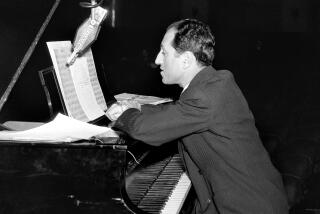Jazz Reviews : Jim Cullum Band’s ‘Porgy and Bess’ Interpretation
- Share via
That composer George Gershwin’s 1935 opera about black life on Catfish Row opened to mixed reviews and ran on Broadway for only 124 performances has had little bearing on its becoming one of the classic pieces in American musical theater. “Porgy and Bess” has been the object of countless interpretations, and such songs as “Summertime,” “My Man’s Gone Now” and “Bess, You Is My Woman Now,” among others, have become both jazz and pop standards.
The latest interpretive entry comes from the Jim Cullum Jazz Band, a San Antonio, Tex.-based septet that performed its “jazz transcription” of the opera at UCLA’s Royce Hall on Friday night. Latest, however, refers only to the chronological placement of the piece; stylistically, the traditional strains of this reworking predates the opera’s opening.
While the flag-wavers for traditional jazz might disdain the lyrical modernism of Gil Evans and Miles Davis’ 1957 collaboration or find crass the big-band brashness of Bill Potts’ 1959 version, they could revel in Cullum’s effort.
Cullum, whose pianist, John Sheridan, is actually responsible for the bulk of the arrangements, has directed an ambitious project. What began as an idea for an album of “Porgy” highlights resulted in a two-hour instrumental concert of the opera’s 28 songs. Unfortunately, Cullum bit off more than his septet could chew.
The highlights of Friday evening’s performance were those inclusions whose upbeat tempos best lent themselves to the good-time feeling of the traditional jazz style; the low lights were the ballads, where the considerable talents of soloist Cullum on cornet, Clive Collins on trombone and Allan Vache on clarinet were undermined by weaknesses of intonation and time displayed by bassist Jack Wyatt, guitarist Howard Elkins and drummer Ed Torres.
Sheridan did an admirable job in creating the charts, interspersing thematic materials in an effective manner in lending the proper instrumental voices to their vocal counterparts. Not all of Gershwin’s tunes are instrumental gems, and the narrative offered by announcer John McNally wasn’t enough to sustain the piece.
Despite the entirety of the opera having been committed to CD by Cullum, one can bet that listeners will be fast-forwarding to the highlights.
More to Read
The biggest entertainment stories
Get our big stories about Hollywood, film, television, music, arts, culture and more right in your inbox as soon as they publish.
You may occasionally receive promotional content from the Los Angeles Times.








